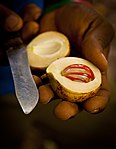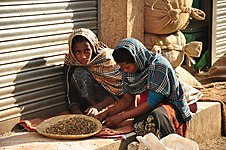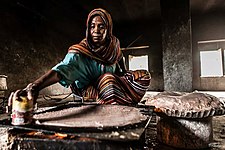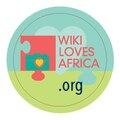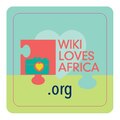Commons:Wiki Loves Africa 2014/Results and best practices
This page gives a description of how Wiki Loves Africa 2014 was organised, the outcomes, and some of the important lessons we drew.
See also
- Results and best practices 2014
- Results and best practices 2015
- Results and best practices 2016
- Results and best practices 2017
- Results and best practices 2019
- Results and best practices 2020
- Results and best practices 2021
- Results and best practices 2022
- Results and best practices 2023
Organization[edit]
The idea came to Isla and Anthere whilst they were organising the m:Kumusha Takes Wiki project in 2013. They thought an interesting way to get Africans interested in contributing to Wikipedia would be to hold a continental photo contest and to support the small volunteer groups and Wikipedians in Community/ Residence in some countries so that they could help foster participation. In 2014, they submitted a request for a PEG grant to the WMF, which was approved in August 2014. Isla and Anthere were the main organisers at the global level. Several wikipedians and a few non-wikimedians came to help online (to set up the website, the pages on commons, to help on translation, work on the design, site notice set up, to be jury, etc.). Local teams in Cote d’Ivoire, Egypt, Ethiopia, Ghana, Malawi, South Africa, Tunisia, and Uganda organized local events to drive contribution (training days, photo hunt parties, mass upload sessions, press conferences, cooking contests etc.).
The contest was communicated through a website http://www.wikilovesafrica.org, a Facebook account, a twitter account, the blogs of Wikimedia France and Wikimedia Foundation, 3 press releases, local blogs, a newsletter sent to 7000 people on the Africa Centre database, via the African Wikimedians mailing list and of course on Wikimedia projects. A site notice was displayed on top of pages of all wikimedia projects for all African countries during the two months of the competition (and for France for a couple of weeks). Photos were only accepted during the two months. A jury of 7 people (4 wikimedians, 3 non wikimedians) made a short list of the best pictures, then selected 3 winners. The top 20 from the jury short list was then submitted to the community for the selection of a 4th price. Winners were contacted and received prizes.
Outcomes[edit]
Content[edit]
The contest resulted in slightly over 6000 photos provided by 873 unique contributors participants in Africa.
- All pictures are listed there: Category:Images from Wiki Loves Africa 2014
- A sub set of the best pictures are here: Commons:Wiki Loves Africa/First selection
- Winning pictures:
-
Nutmeg by Terrence Coombes from Tanzania
-
Egyptian grains by Dina Said Eid, from Egypt
-
Girls cleaning coffee by Natnael Tadele, from Ethiopia
-
Sudanese woman making the traditional baking called "Kisra,
by User:Alfateh2005 (Mohamed Elfatih Hamadien), from Sudan
The countries with the largest number of contributions were Ivory Coast, Ghana, Tunisia, Uganda, Egypt, Marocco and South Africa.
Events[edit]
Locally, several groups of wikipedians facilitated the project in organising various events.
25 related events were organised in 8 countries
- 6 events in Ivory Coast
- 5 events in Malawi and Uganda
- 4 events in Ghana
- 2 events in South Africa
- 2 events in Tunisia
- 1 event in Egypt
These events were of different nature. 12 of them were photo-hunt/upload events, 3 were press conferences, 2 were cooking competition, 1 was a edit workshop and the others were wiki meet-ups.
-
Wiki Loves Africa workshop in Sousse
-
Mois de la contribution in Tunis
-
Cap Town Cook off
-
Photo des participants de l'atelier Wiki Loves Africa dans les locaux du PASC à Sousse, assuré par Wikimedia TN User Group et CLibre
-
Meeting in Ghana
-
Cooking contest with a few Interacts of the Rotary Club at DEKS Educational Institute (Ghana)
-
Cooking contest with a few Interacts of the Rotary Club at DEKS Educational Institute (Ghana)
-
Cooking contest in Ghana
-
Equipe de wikipédiens au Festival national des mets ivoiriens (Fesnami) 2014
-
Equipe de wikipédiens au Festival national des mets ivoiriens (Fesnami) 2014
-
Kumusha Takes Wiki/Wiki Loves Africa press conference in Ivory Coast
-
Datamine students in Uganda
-
WikiAtelier du 25 octobre 2014. Coaching photo et téléversement dans le cadre de Wikiloves Africa Cuisine 2014.
Communication venues and material[edit]
A fair amount of material and communication venues have been developed in a rather short time.
- A website http://wikilovesafrica.org has been set up in English, French and partially arabic.
- A twitter account
- A Facebook page have been largely used all along the contest : 4000 likes
- a visual identity has been set up (see the gallery)
- a pull up banner, flyers, email banner, and stickers have been designed and made available to local teams (see gallery)
- a page has been set up on meta
- a set of pages, translated in various languages have been set up on commons
-
Logo
-
flyer
-
pull up banner
-
round sticker
-
square sticker
-
rectangle sticker
-
tee-shirt
-
email banner
-
use of flyers in Ghana
-
use of flyers in South Africa
-
Pull up banner in Uganda
Visibility[edit]
The project was mentioned in national and regional press. The press was reached through press releases : 3 were produced and translated in main langages during the project (one at start, one mid contest and one to announce winners) and through 3 press conferences held locally. The global press release was sent to xx recipiendaries.
- Press release at launch (EN)
- Press release at launch (FR)
- Press release at launch (AR)
- File:PR EN Mid WLAContest.pdf
- File:PR FR Mid WLAContest.pdf
What we learned[edit]
Description[edit]
Wiki Loves Africa 2014 was a photographic / media contest that encouraged people from across Africa, and beyond, to celebrate Africa’s diversity and cultural richness through images or videos illustrating the theme “cuisine”. The competition took place between the 1st October and 30th November and was accompanied by focus events in eight countries: Côte d'Ivoire, Egypt, Ethiopia, Ghana, Malawi, South Africa, Tunisia, and Uganda. The project was funded by the Wikimedia Foundation and the Orange Foundation.
Results[edit]
By the close of the competition, 6,116 images were entered by 873 unique contributors from 49 countries. Countries with the largest number of contributions were Côte d'Ivoire, Ghana, Tunisia, Uganda, Egypt, Morocco and South Africa. There were local teams on the ground in Côte d'Ivoire, Ghana, Egypt, Ethiopia, Malawi, South Africa, Tunisia, Algeria and Uganda. These country teams, made of volunteer groups, hosted 27 on-the-ground events that related to the contest. We were also pleased to see enthusiastic response and high participation levels from countries such as Nigeria, Kenya, and Tanzania that did not have local events in those countries. The project was mentioned in national press in these countries.
Timeline[edit]
We knew time was likely to be short. Well, it was short.
The grant was approved mid-August for a contest starting 1st of October. We knew it would be challenging but we wanted the event to coincide with the “month of contribution” in Francophone countries (that takes place in October) and we wanted to be able to rely on the WiCs of the Kumusha project and WiRs of the WikiEntrepreneur project to help locally in countries that did not have formalised groups of Wikipedians. So, we decided to keep the schedule as originally planned.
Some elements were on time whilst others should have been there earlier. For example, we met some issues with the designer, which resulted in marketing material (in particular leaflets) being a bit late, which was not best for local teams for the first events. Website and guidelines on Commons were published just on time, but translations were a bit late (see section about translation). Obviously, this was also a bit hard to handle for local teams who wanted to organize events, but had rather short delay to do so.
It also took more time for the volunteer jury to select pictures than we had expected (we think this is because it was over the Christmas period) resulting in delay in announcing winners.
But we managed.
And next year it will get easier as some elements can be reused from 2014 campaign. And there will be longer lead times … launching the project in July will definitely make things easier.
Theme[edit]
The theme was meant to give communities and entrants a focus around a subject that is universal, but culturally specific. For the first theme, we chose Cuisine.
From the competition’s experience, it is important to make it clear to people what falls in the scope of the contest. On one hand, the theme has to be narrow enough to be interesting to potential participants and give a clear focus to the contest and make it easy to "sell". On the other hand, it has to be wide enough to allow everybody to participate with a relatively low threshold. It was very helpful that we provided sample images of what we were expecting, as well as a list of categories of topics that could be listed in the broad theme “cuisine”.
Still, we noted in several instances that local volunteers simplified the message when talking to potential participants or to the press and narrowed the topic (for example mostly mentioning dishes and recipes, and completely dropping food production, processing or utensils).
In other cases, the entrants completely ignored the theme and uploaded images of themselves, their qualifications or in some instances animals from their last safari. The only media submission was a video of a guy dancing on the streets of Dar Es Salaam.
Next time, it will be useful to provide more obvious “communication material” to everyone participating in the project so that the theme is better focused.
Website, social media content and translation[edit]
We had decided to use three different media for communication around the project. First a website (wordpress based, in three languages). Second Facebook. Third Twitter.
We expected that initiatives (events) would be the object of publishing on the website. It did not really happen for various reasons (no account, langage issue, poor knowledge of word press, etc.). Further, the wordpress translation plug-in ended up being more trouble than was expected.
Facebook was the easiest way to collate whatever information we could dig. It is probably easier to just stick with Facebook in the future as the tool is happily used by local user groups. Facebook ads were used a couple of time to bring maximum exposure to the project. The initial experiment with this proved very effective, and in future, the facebook ads will be used more strategically to gain attention for the project.
Translation turned out to be a real chore on Commons. As the content was developed on-the-go, translations needed to be fixed many times, which requested the help of translation administrators. Bugs in the system meant that the system did not always feature the text that had been translated. Translation systems were next to impossible to use in a table. Unless the translation system is improved, it is unlikely that we will use it next year (at least, not in pages that need to be changed over time).
Volunteers and movement[edit]
As with almost everything organized which has a direct relation with the projects, volunteers are critical for success. Generally, the contest was blessed with many volunteers helping, in particular at the local level in each country. Several groups of already existing editors were strengthened and developed thanks to the contest, as it gave them some goal and activities to focus on that was supported as part of a larger project. Upon looking at the final figures, it is obvious that the contest has been most successful in countries where volunteers already exist, and where there was a team that worked together. In the countries with no or very few local wikimedians, the project did not see such a positive result.
Given that the timeline was very, very short, there was not much time to build communication channels with the local volunteers from the beginning of the process.
Within the non-African Wikimedian community, the interest has been very low, if not nonexistent and this was quite disappointing. Three examples can be mentioned:
- many images uploaded still miss proper categories on Commons and have not been used to illustrate articles;
- we asked Wikimedia France to send the first and, then later, the second press releases to its list of press contacts, and this did not happen (the contest was visible from France on site notice in October)
- we mentioned the project to the SignPost, as we thought it could be interesting for the wider community to know and participate in the two months it was running, but it did not raise their interest
This is unfortunate because whilst the call on site notice was visible all over Africa throughout the two months, Wikimedians from the African Diasporas had no way of knowing about the contest, except if reading the blog of Wikimedia France where we posted it twice, if they were part of the African Wikimedians mailing list, or the blog of Wikimedia Foundation (two posts as well).
Hopefully next year the project will be started earlier and it will be possible to better communicate about the contest, and will foster more interest from the community.
Focus countries[edit]
When the grant was discussed with Wikimedia Foundation, it was decided that some budget would be dedicated to financially supporting a few countries (called focus countries). These were chosen in large part based on existing local user groups or unofficial groups. The idea was to support those editors in the organization of local events by funding whatever could be needed (from renting a room to printing marketing material; or from supporting travel costs to funding food ingredients for a cooking contest). This was a great move and we could see that countries in which there was a local team were generally way more productive than others. The contest generated much enthousiasm and was a good energizer !
However… it also created a bit of unrest and misunderstanding. First because there was a bit of confusion over which countries were concerned by the contest (some people understood that the contest was taking place ONLY in focus countries). Second because some local groups felt dismissed when they were not in the list of focus countries.
When we got aware of these issues, we tried to “tone down” as much as possible the gap between focus countries and the others from a communication perspective. In the future, we suggest that this notion of “focus country” be mentioned as little as possible in public communication.
Quality of images[edit]
Generally, the quality of images seems to be lower in the WLAf contest compared to other contests such as Wiki Loves Monuments or Wiki Loves Art or Wiki Loves Earth. This seems to be because most of the pictures provided are not taken from high quality cameras but rather from cell-phones. Also, because of low connectivity speed or data costs, the images uploaded are often of rather low resolution. This results in many images of quality not up to our standards on the Wikimedia projects. It is unlikely that other photo contests in Africa will spontaneously get better on that issue. But it also may be due in part to some members of local teams not being photography experts. Directions of improvement might be
- looking for partners for good photographic material to be gifted to user-groups
- looking for more partnerships with photographic related professionals (this one might be tricky)
- organizing locally photographic workshops (perhaps with the help of chapters who already did that)
- making available some additional material for guidelines and recommendations
Quantity and uploading issues[edit]
Uploading meetups turned out to be even more complicated than we expected. Whilst a few organizers mentioned electricity issues, connectivity and limited number of devices per participants were largely reported. This had several consequences.
First, it obviously had consequences on the number of images uploaded. During photo contest in developed countries, such as Wiki Loves Monuments, it is not unusual that a participant upload dozen of images of the same monument. A photo hunt trip to a european market place could result in a hundred of pictures. In the case of Wiki Loves Africa, the number of pictures is much smaller as people tend to take much less images overall.
Also, the pictures tend to be uploaded in lower resolution.
Despite of this, some uploading sessions just did not go through at all, resulting in frustration from participants of an earlier photo hunt trip.
In some instances, the photos were uploaded in batches by someone else afterwards, resulting in poor (if not plain lacking) attribution and file description.
Improvements may come from
- looking for more partnerships to get access to proper uploading spots
- more devices proposed to participants
- more training sessions to Commons mass uploading tools
- additional material pointing out to the importance of authorship attribution, file description, categories and licences, and helping to get that done well
We had originally planned to develop a phone tool for direct upload to Commons. It is not obvious that it would have helped.
Media[edit]
Press was a bit of a challenge. 3 press releases were produced but not necessarily widely distributed. The English version was largely distributed to the network of Africa Centre. The French or Arabic version much less so and resulting press articles were quite low.
Some local teams organized press conference with various degrees of success. In some cases, journalists asked for a per diem to attend the press conference. Whilst we had good success in countries (such as Ivory Coast), the media answer was limited.
Jury and selection of best images[edit]
We decided (and succeeded) to get a mixed jury. We had a jury of 7 people, 4 being wikimedians and 3 professionals.
The 4 wikimedians managed the first selection of images. Each jury member individually selected his best off list. All best-off images were then pooled together in a first set.
The 7 jury members had to select their 40 best images in the first set and attribute from 1 point to 40 points (best). The winning photos were those with the highest score.
The awards were offered only at the continental level.
It was a bit difficult to mobilize all jury members and this resulted in delays in announcing the winners compared to the date which had been originally announced. Whilst delay is not a big issue, next year… we need to extend the time planned for the photo selection :)
Whilst it was not what was originally planned, we decided that the fourth prize would not be selected by the official jury, but rather by the community. We consequently proposed the community to vote on a sub selection (the best rated images, excluding the three winning pictures). That community selection went well, except for one detail… we had proposed that votes would happen either on the commons appropriate page, or on twitter or on facebook. We realized quickly that making it possible to vote through social media was actually a mistake.
- It made voting too easy as the voter did not even need to actually come to the page where images where displayed;
- It lead to voting on an image based on its country of origin rather than on the intrinseque qualities of the image;
- It did not foster visits or account creation to Commons.
Toward the end of the voting time, we consequently decided to disable voting options from social medias.
Except for this issue, we thought the mix between winners selected by jury and by community a good move.
In terms of judging criterias, we chose to reuse the criterias of WLM, with one notable exception though: images has to be self uploaded OR uploaded during an official mass upload session (typically organized by a local group).
Awards and winners[edit]
Given the short timeline, we had not finalized the list of awards when the contest started. This was unfortunate as the first press release (which gave the most press) did not specify what could be gained by a participant and some local teams reported many questions on the topic at the beginning of the contest. At the end of the contest, we have been able to get in touch with all winners :)
